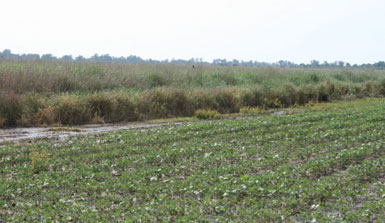While Big Food companies are against GMO labels on food, they seem to be moving forward on other issues as members of the Alliance for Sustainable Agriculture – General Mills, Kellogg’s, Unilever, Procter & Gamble, Coca-Cola, PepsiCo and Cargill are among the members.
The Alliance consists of 66 grower organizations; agribusinesses; food, beverage, restaurant and retail companies; conservation groups; universities and public sector partners, they say, all committed to "sustainable outcomes for commodity crops such as corn, soybeans, wheat, cotton, rice and potatoes."
Their "Field to Market" initiative is engaging the entire agricultural supply chain to "address the collective environmental challenges we face and responsibly manage our planet’s natural resources," says Rod Snyder, President.
The goal is to improve agricultural practices for 20% of US commodity crop production on 50 million acres by 2020.
Williams Farm in Mississippi grows corn, soy and cotton on 40% of the land, and preserves habitat for bobwhites and waterfowl:

Members pledge to:
- reduce soil erosion to tolerable levels or below on all US cropland
- improve productivity on farms to preserve wildlife habitat
- improve regional water quality by reducing sediment, phosphorus, nitrogen, and pesticide loads from farms
- improve regional water availability through efficient irrigation and conservation.
- increase energy efficiency in crop production
- reduce greenhouse gas emissions from farms per unit of output
The Alliance has a calculator that estimates farm performance on land use & conservation, carbon in the soil, water quality and consumption, energy use and greenhouse gas emissions. The next step is to work with The Sustainability Consortium on a way to measure and report on the sustainability of US agriculture.
By 2020, the US could cut emissions by 2 gigatons and 3 gigatons by 2030 by decreasing emissions from livestock, fertilizer and soil; reducing food waste and consumption of high-emissions foods, and increasing sequestration through reforestation. Worldwide, these account for a whopping 25% of all emissions, according to "Halfway There? What the Land Sector Can Contribute to Closing the Emissions Gap Post-2020," by Union of Concerned Scientists.
Read our article, Radical Agriculture Overhaul Would Enhance Global Ecosystems.
Learn more about Field to Market:
